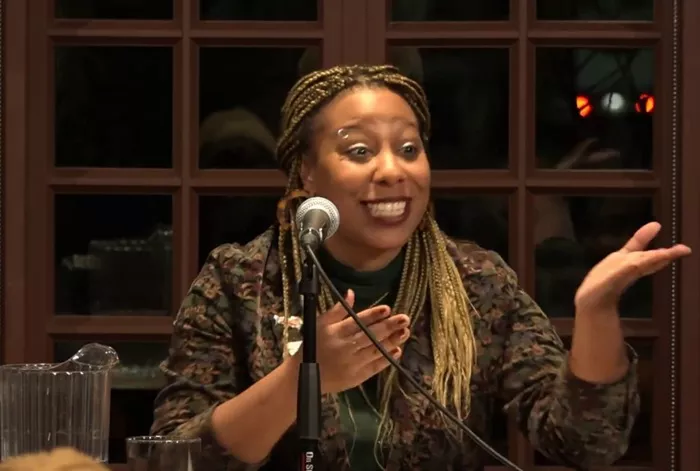Award-winning poet and essayist Morgan Parker is bringing her thought-provoking work to Ann Arbor. On December 5, she will read from her latest collection You Get What You Pay For at the University of Michigan Museum of Art (UMMA). The reading, part of the Zell Visiting Writers Series, will take place from 5:30-6:30 p.m. at UMMA’s Helmut Stern Auditorium.
Parker is the author of several poetry collections, including There Are More Beautiful Things Than Beyoncé and Magical Negro, which won the 2019 National Book Critics Circle Award. Her work also includes the young adult novel Who Put This Song On? and her new essay collection, You Get What You Pay For, published in the spring of 2023. Parker, who received a 2016 Pushcart Prize and fellowships from Cave Canem and the National Endowment for the Arts, uses her writing to examine both personal and political topics, with a focus on pop culture.
Reflecting on her early writing, Parker recalls how humor first drew her to poetry. “When I didn’t even know if my poems were good, I knew they were funny,” she says. “Humor is what drew me to poems in the first place.” As an undergraduate, she often challenged traditional poetry forms, even writing a sonnet about her college roommate or a martini, using the rigid structure of the 14-line sonnet to undercut centuries of poetic tradition.
“I’m definitely a person that wants to challenge myself,” Parker explains. “I have to take a step back, let the writing lead, and be down to follow it to whatever form it holds.”
In You Get What You Pay For, Parker explores a wide range of subjects, from Bill Cosby’s legal battles to Kanye West’s controversial statement about President George W. Bush’s response to Hurricane Katrina. Other topics include police brutality, white supremacy, and the lasting effects of slavery. Yet, Parker’s work does more than list these issues; it weaves them together, showing how each topic is interconnected. For example, she explores how her own mental health is linked to systemic racism and the legacy of slavery.
In the collection’s first essay, Parker reflects on her childhood, writing, “Even as a child I understood that there was always a me I desperately needed to keep secret, dark patches to tuck away under my public self; a performance that sometimes required rising to the occasion of myself, and with each occasion the dark parts dug deeper into a sinking feeling.”
Parker compares writing essays to the process of writing poetry. While poetry often pairs images side by side, an essay takes longer to unpack similar ideas. “For me, that’s often frustrating,” Parker admits. “I don’t understand why we need to connect all the dots.” However, she recognizes the value in this process, calling it “a very good American lesson” that emphasizes critical thinking and learning from the past.
In her book, Parker also addresses the concept of cultural memory, often describing it through the image of the slave ship. She writes, “When I insist to a white friend now that ‘I was on the slave ship,’ that I remember it in ancestral flashbacks, when I name it Trauma, when I argue about the delineation of past and present—it isn’t just that he doesn’t understand, it’s that the ‘rules’ are on his side to say otherwise.”
Parker challenges the idea of linear time, insisting that everything is interconnected and compressed. “Everything is so collapsed,” she says. “It’s not a forward-moving progression.”
Looking ahead, Parker is exploring new projects, including a potential novel. “I’ve got some scribbles, but I can’t call them poems yet,” she says.
Parker’s work continues to resonate with readers, inviting deep reflection on both personal identity and larger social issues.

